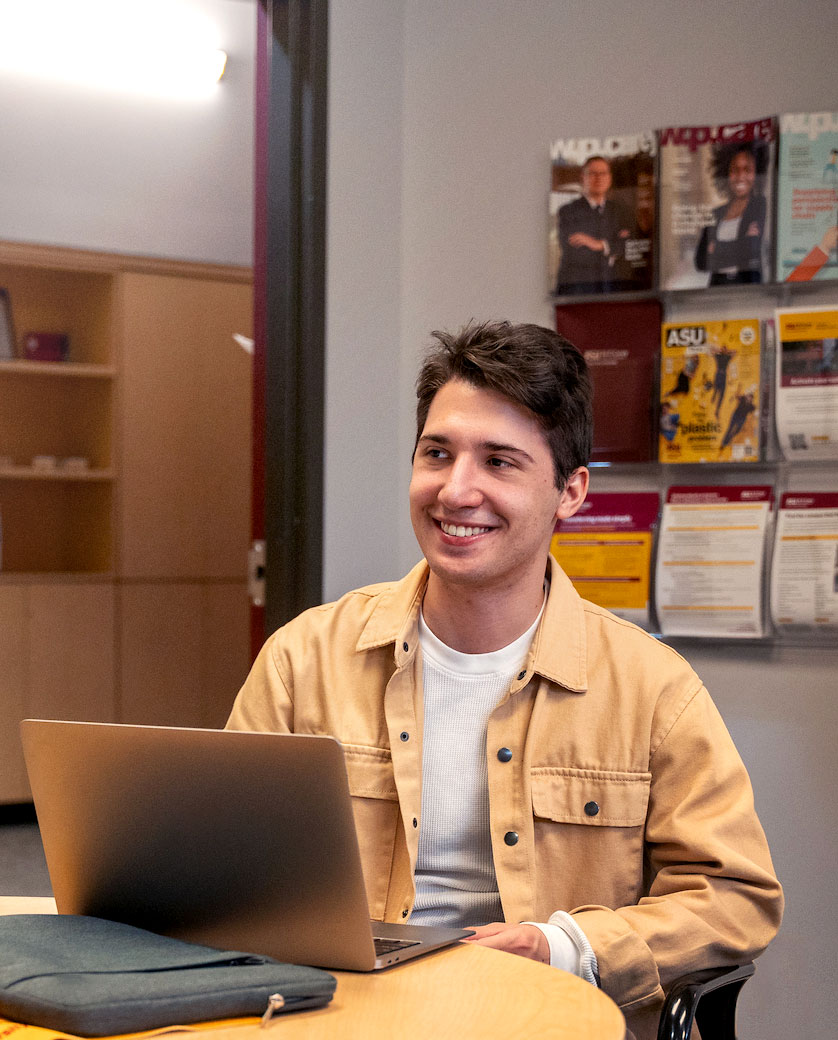
>> Business Student Stories
Making an impact through connections: An interview with student Dachi Tabatadze

Dachi Tabatadze
ASU’s W. P. Carey School of Business offers countless opportunities for undergraduates to get involved. By joining, leading, and creating new clubs and organizations, students gain valuable skills and experience for diverse careers, form connections with peers, and give back to the community.
Undergraduate student Dachi Tabatadze (BS Business Data Analytics & Supply Chain Management '25) has taken full advantage of such opportunities, joining professional groups like the Arizona Microcredit Initiative and co-founding the Spirit of Fleischer organization, which helps Fleischer Scholars summer program alumni stay connected.
"It's been going wonderful," he says about Spirit of Fleischer. "I love to see the impact the organization is making and I hope it can move forward for many, many years."
The W. P. Carey School interviewed Tabatadze to learn about his experience as an international student coming to ASU from Europe, how W. P. Carey supports students in their academic careers, and what it's like to be involved in student clubs and organizations.
Q&A with Dachi Tabatadze
Discover what it’s really like to be an undergraduate student at ASU’s W. P. Carey School of Business, Where Business is Personal.® This conversation with Dachi Tabatadze has been edited and condensed.
Question: What brought you to ASU and W. P. Carey?
Answer: I originally came here from Europe in 2018, and I was brand new to Arizona. My mom did go to school at ASU, she was pursuing her PhD, so I was a little bit familiar with ASU. I was able to check out the campus, do a couple of tours, and meet a couple of people who already went to W. P. Carey. I heard about their experiences, things they were involved in, and opportunities they had through the business school.
Since then, I've been able to pursue the opportunities that I saw those students pursuing when I was an incoming student. That made me feel like I made the right decision, and I'm really excited that I came to W. P. Carey.
Q: How would you say international students are supported and welcomed at W. P. Carey?
A: Being an international student is challenging. The transition to college is particularly harder for international students because there are processes that take place that domestic students don't have to go through.
ASU and W. P. Carey have a lot of resources to help you in that transition. There's the International Students and Scholars Center, which helps you through the processes of getting all your documentation ready for pursuing internships or housing, and other related things. You can always go to them, and you have individualized advising opportunities through them, which really helps because you don't have to dig around to find out who to go to.
On the W. P. Carey side for academics and career, I have individual academic advisors for both of my majors, as well as career coaches for both majors. It makes it really easy for me to find opportunities that are more tailored for international students and companies who are willing to work with international students.
I've also been able to connect with W. P. Carey students who were older than me at the time who had that experience of going through the process of looking for internships and applying for jobs, who gave me advice on documentation and processes and such. W. P. Carey did a good job of connecting me with students who wanted to share their personal experiences.
Q: How did you choose your business majors, and what do you like about them?
A: I originally came in as a business communication major, and like a lot of first-year students, I wasn't exactly sure what I wanted to do. I was still exploring opportunities, and partially why I like W. P. Carey is because there's so many different major options. I knew there was a possibility that I would double major or switch my major if my interests changed. I was able to talk to a bunch of different students who were in different programs and organizations, which were tailored toward different industries and majors. It gave me a better understanding of what I wanted to do.
So pretty shortly, I switched my major to business data analytics. Eventually I did competitions and research opportunities in supply chain and decided to choose supply chain management as my second major.
Q: How did W. P. Carey and your academic advisors make it easy for you to pursue concurrent degrees?
A: When I first found out it was an option to earn concurrent degrees, I wasn't exactly sure what I wanted as my second major. My academic advisor was very helpful. They recommended I take a couple of general introduction courses that I would have to take anyway, so I could get a taste of the different fields. After taking those courses, I was able to understand which topics I preferred and which ones I wanted to pursue more long-term and in-depth.
Data analytics and supply chain go well together because of how data-driven supply chain decisions are becoming, as well as other things in general in the business world. I had a lot of support from academic advising as well as the career coaching team on how to correctly approach the process and transition from one major to another and eventually double major while staying on track to graduate in four years.
Q: Why is it important for you to be involved in the Fleischer Scholars summer program?
A: Fleischer Scholars is a summer program for high school students in Arizona. It’s been a very important part of my college experience for a few reasons. First of all, when I join different programs or organizations, I try to look into their mission statement of why they're doing what they're doing. I have a lot of respect for the Fleischer Foundation and the summer program, which is aiming to support first-generation college students to bridge that gap and help them pursue a college education.
I know I'm very fortunate to be here as an international student and pursue my education at a top business school like W. P. Carey. I understand the importance of programs like Fleischer Scholars and how they can have a lasting impact. You can change the trajectory of someone's life by giving them opportunities they otherwise would not have been able to have. That is important to me.
As a program facilitator, I get to be a part of the process of helping other students through mentorship. A large part of the program is mentoring high school students as a college student. It's enjoyable for me to work with individuals who have all the potential in the world to come to W. P. Carey, and pursue those great things after graduation, but they just need a slight push and support in that process. I had a lot of people when I first came here who supported me and mentored me, so I want to give back. I’m proud to help these students achieve their dreams in terms of coming here, getting those scholarships, and making college possible.
Q: What was it like the first time you stepped foot onto ASU’s Tempe campus, and what's your favorite place on campus?
A: Coming to campus for the first time can be intimidating, but very rewarding. The campus is beautiful. You see all of these amazing places, and you can also get a feeling of how students are going about their everyday lives in terms of going to class. It's exciting.
I remember the first time I stepped foot on campus as a student. I was looking for a class, and I could see it was the first day of school because everybody was trying to find their classes, which was a bit overwhelming. Once I found the class and met the professors and my fellow students, the experience was great. If you have difficulty finding classes and other places at first, there are different tools like interactive maps on MyASU to support us, as well as just asking around.
As far as my favorite place on campus goes, I really enjoy the W. P. Carey Dean's Patio, in front of the Business Administration building and BAC building. Many business students spend a lot of their time there working on homework, interacting with each other, and doing coffee chats. Starbucks is right around the corner and there are also companies that visit for recruiting events, so it's always a good place to be.
Q: What advice do you have for new W. P. Carey students?
A: My biggest advice for anybody that wants to come to W. P. Carey would be to ask a lot of questions, and seek advice and mentorship. When I came into college, I did not have answers to a lot of the questions I had, and I think it’s impossible for new students to have all the answers. This is why W. P. Carey has developed first-year experience events, leadership opportunities, and other programs that support you like academic advising, career coaching, admissions coordinators, and more.
Continuing students will also share their experiences with you. All you have to do is ask. I recommend interacting with as many people as possible and asking lots of questions. That’s really worked for me. Learning from the students who came before me helped me pursue some of the most exciting opportunities that I've had so far. Many of my mentors have been fellow students, some have graduated, and we stay in touch. The connections you make at W. P. Carey will go far beyond college.
Connect with W. P. Carey
Request information
about ASU business programs
Make an admission appointment
or schedule a campus visit
Talk to a student leader
Business Ambassadors are on every campus
Access information
for current students